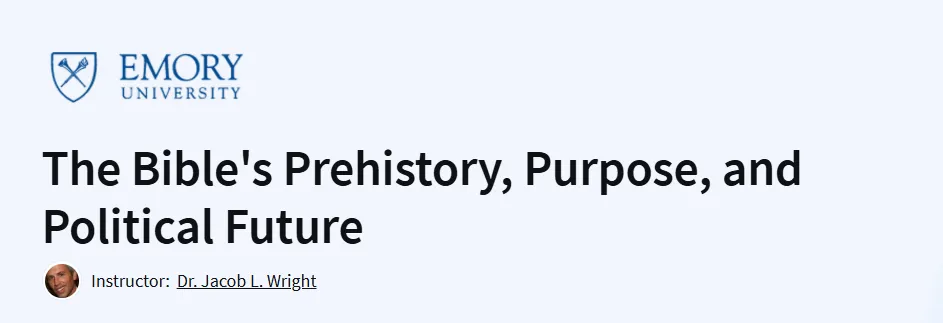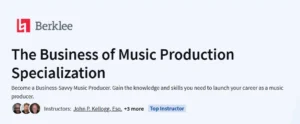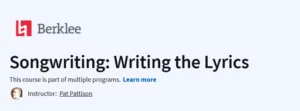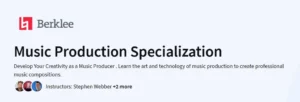What you will learn in The Bible’s Prehistory, Purpose, and Political Future Course
- Historical-critical analysis of biblical texts
- Ancient Near Eastern cultural contexts
- Composition theories of the Hebrew Bible
- Archaeological evidence interpretation
- Political theology in biblical narratives
- Comparative religious studies approaches
- Modern relevance of biblical themes
Program Overview
Biblical Origins
⏱️ 2 weeks
- Examines the Documentary Hypothesis, source criticism, and oral tradition roots.
- Includes Dead Sea Scrolls case studies.
Historical Contexts
⏱️ 2 weeks
- Analyzes Mesopotamian, Egyptian, and Canaanite influences.
- Features archaeological site virtual tours.
Political Narratives
⏱️ 2 weeks
- Explores monarchy, exile, and covenant themes.
- Includes comparison of biblical and ancient law codes.
Contemporary Relevance
⏱️ 2 weeks
- Discusses biblical legacy in modern politics and ethics.
- Features interfaith dialogue frameworks.
Get certificate
Job Outlook
- Professional value: Essential for clergy/educators
- Academic pathways: Foundation for divinity degrees
- Cultural competency: Valuable for historians
- Certification benefit: Recognized by seminaries
Specification: The Bible’s Prehistory, Purpose, and Political Future
|
FAQs
- Explores how the Hebrew Bible emerged after the fall of Israel and Judah, serving as a unifying text for people without a state. (e.g., shaping national identity in crisis)
- Examines the Bible as a pedagogical project of peoplehood—an educational curriculum designed to build community and shared memory.
- Investigates political themes—how texts affirm identity beyond borders, offering political resilience through narrative, law, and ethics.
- Connects ancient responses to defeat with modern implications—how shared texts serve as models for cultural survival and civic identity.
- Questions traditional religious framing by emphasizing the Bible’s role in forming identity and communal memory—not just theology.
- Led by Jacob L. Wright, Associate Professor of Hebrew Bible at Emory University’s Candler School of Theology. (MOOC lecturer)
- Wright is a scholar of biblical composition, authorship processes, and the sociopolitical context of Israelite texts, with published works on Nehemiah and canonical origins.
- The course reached a global audience—~27,000 enrolled from 174 countries—highlighting its wide scholarly and public resonance.
- Offered through Emory University via Coursera—integrating academic rigor with accessible, online learning.
- Runs for approximately 20 hours total time commitment.
- Covers a 7-week structure, with topics that map archaeological, historical, literary, and ideological angles. (Weeks 1–7)
- Weekly modules include:
- Origins and purpose of the Bible
- Rise and fall of Israel and Judah
- Formation from defeat
- Reinvention of heroism
- The Bible as educational curriculum
- Covenantal ethics and civic identity
- Future political role of the Bible
- Self-paced, fully online with flexible deadlines and multiple language subtitles (e.g., Spanish, French, Portuguese, Russian).
- Includes quizzes, readings, and reflective engagement to help learners absorb key themes.
- No prior theology or biblical study is required—it’s intended for a broad audience, from novices to experts.
- Takes an interdisciplinary approach—drawing on archaeology, political theory, and historical context—so curiosity matters more than background.
- Encourages critical thinking about narrative formation, community identity, and survival strategies rather than doctrinal acceptance.
- Position taken allows appreciation regardless of religious stance—whether religious, secular, or academic audiences.
- Ideal for anyone interested in history, religion, politics, literature, or cultural memory.
- Yes—a shareable certificate of completion is available if you enroll in the paid certificate track.
- You can audit the course for free, giving access to lecture videos and readings (certificate not included).
- Financial aid may be available based on Coursera’s policies.
- Flexible deadlines allow you to learn at your own pace, making it accessible for varying schedules.
- Subtitles in multiple languages improve accessibility for non-native English learners.





